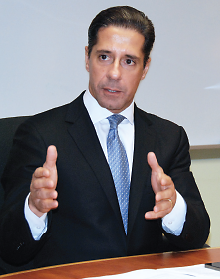Miami Schools Expand ‘Typical or Troubled?’ Program
Abstract
The head of one of the nation’s largest school systems lauds the value of a program focusing on early recognition and intervention for students’ mental health problems.
The American Psychiatric Foundation’s “Typical or Troubled?” school mental health education program now being implemented in the Miami-Dade County School system is training key staff members in the nations’ fourth-largest school district on how to educate their coworkers about signs of mental illness in students.
“Typical or Troubled?” trains teachers, other school personnel, and students to differentiate ordinary teenage behavior from possible mental health warning signs.

The American Psychiatric Foundation’s “Typical or Troubled?” program can help teachers and students overcome the myths and stigma around mental illness, said Miami-Dade County Public Schools Superintendent Alberto Carvalho. “This is one world, and we ought to be compassionate, smart, accepting, and sensitive.”
”We are doing a deep dive into intervention and prevention, empowering our people to engage in the early identification of behavior that is troubling to a student but can be mitigated if addressed early on,” said Miami-Dade County Public Schools Superintendent Alberto Carvalho, in an interview with Psychiatric News.
The program works on a premise analogous to education, he said: “It is best to invest aggressively early on in the social and academic facets of raising a child than to deal with the remediation costs for a 10th grader.”
Carvalho has headed the Miami-Dade schools since 2008 and was named the National Superintendent of the Year by the American Association of School Administrators in February.
The program originated as a collaborative pilot program in Denver involving the foundation and the Colorado Psychiatric Society following the 1999 Columbine High School shooting in that state.
“Overall, it’s been well received in Miami,” said Ava Goldman, M.Ed., administrative director of exceptional student education and student support in the Miami-Dade system. “The goal is helping our staff people to know when and how to get help for students.”
The target audience extends beyond classroom teachers to include custodians, bus drivers, cafeteria workers, and clerical personnel, she said. In mid-March, two students selected from each school began a one-year training course to learn the same principles. Next year, the school system will begin including parents in the program.
“We will have a counseling team in each school to work on risk assessment,” said Goldman. “They will see if the student’s issues can be managed with resources within the school or if referral to system counselors is needed.”
Adoption of “Typical or Troubled?” by a district the size of Miami-Dade, with its 350,000 students in 450 schools, marked a major step for the program. Previously, the largest system to incorporate the program was Albuquerque, N.M, with 93 schools. Overall, the program has been implemented in more than 500 urban, rural, and suburban schools or districts in 38 states.
“We didn’t do this because we wanted to be nice,” said Carvalho. “We did it because we had significant problems and wanted a solution that was the right thing to do from an educational, humanistic, and economic perspective.”
Miami-Dade County has an unusually high proportion (9 percent) of residents with a mental illness, noted Miami-Dade County Judge Steven Leifman, J.D., a member the foundation’s board, who originally brought “Typical or Troubled?” to Carvalho’s attention.
Leifman developed the Eleventh Circuit Criminal Mental Health Project to divert defendants with mental illness out of the criminal justice system and into community treatment. “Typical or Troubled?” was one way to recognize early possible symptoms of mental illness and intervene before young people ended up in social or legal trouble, he said.
“Mythology and stigma set people with mental illnesses apart from people with other illnesses,” said Carvalho. “But mental illness ought to be seen and treated like any other illness. There is no tolerance without understanding and no understanding without education.” ■
Information about the American Psychiatric Foundation’s “Typical or Troubled?” program can be found here.



